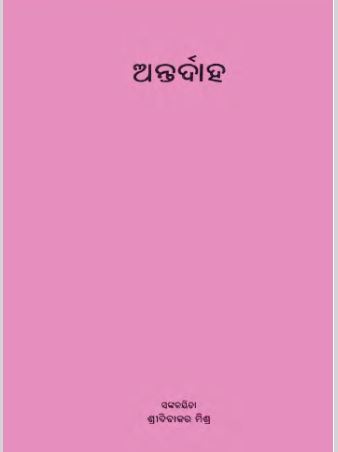Published in 2001, “Antardaha” is a seminal work in Odia literature penned by the erudite writer, Dibakar Misra. This book is not merely a collection of essays; it is a philosophical exploration that delves deep into the human psyche, societal ethos, and spiritual nuances. With a mastery over language and a perceptive mind, Misra presents discussions that are both reflective and revealing, making “Antardaha” a cornerstone in the realm of Odia literature.
At the heart of Misra’s essays is a keen observation of life’s multifaceted nature. He dissects various aspects of existence, ranging from the mundane to the metaphysical, and presents them with a blend of scholarly insight and accessible prose. The essays are arranged thematically, with each section addressing different facets of life, thereby offering a holistic view of the world as observed by the author.
One of the standout sections of the book is the philosophical discourse. Misra draws from a rich tapestry of philosophical traditions, merging Eastern and Western thought to provide a comprehensive understanding of human existence. His philosophical essays are not just theoretical musings; they are deeply personal reflections that resonate with universal truths. Through his contemplations, Misra urges readers to introspect and question the very essence of their being, making philosophy not a distant academic exercise but a practical guide to living.
A significant part of “Antardaha” is dedicated to the exploration of Sri Chaitanya, a revered figure in the Bhakti movement. Misra’s portrayal of Sri Chaitanya is both reverent and analytical. He delves into the saint’s life, teachings, and the spiritual revolution he instigated. Through eloquent narrative and critical analysis, Misra paints a vivid picture of Sri Chaitanya’s impact on cultural and spiritual life. This essay serves as a tribute to the enduring legacy of Sri Chaitanya, bringing forth his philosophy of love, devotion, and universal brotherhood. Misra’s deep respect for the subject is evident, yet he maintains a critical lens, examining the historical and social context of Sri Chaitanya’s influence.
Misra’s writing style is marked by its clarity and emotional depth. He has an uncanny ability to communicate complex ideas in a manner that is both engaging and enlightening. His language is poetic at times, scholarly at others, but always deeply insightful. This ability to blend erudition with readability is what makes “Antardaha” accessible to a wide audience, from academics to lay readers. The use of metaphors, anecdotes, and personal reflections enriches the narrative, making each essay a journey in itself.
Furthermore, “Antardaha” serves as a critical commentary on contemporary social issues. Misra does not shy away from addressing the pressing matters of his time, whether it be social justice, ethical dilemmas, or cultural conflicts. He challenges readers to confront the societal status quo and ponder over possibilities for reform and improvement. This makes the book not only a reflection of its time but also a timeless mirror to society’s perennial issues.
In conclusion, “Antardaha” by Dibakar Misra is a profound contribution to Odia literature. It stands out for its philosophical depth, insightful portrayal of Sri Chaitanya, and critical engagement with social issues. Published in 2001, the book continues to be relevant and thought-provoking, encouraging readers to embark on an inward journey of self-discovery and outward reflection on the world around them. Whether you are a student of philosophy, a devotee of Sri Chaitanya, or a seeker of profound truths, “Antardaha” has something invaluable to offer.
Books Info
| Books name | Antardaha |
| Author | Dibakar Misra, C. |
| No Of pages | 185 |
| Publisher | Goswami Press |
| Publication | 2001 |
| Printed At | Goswami Press |
| Distributor | NA |

